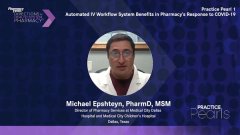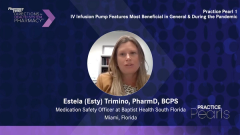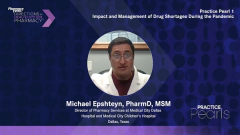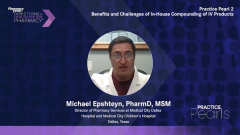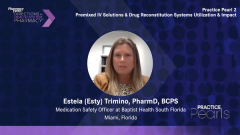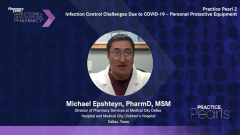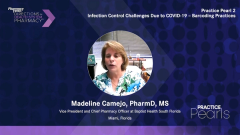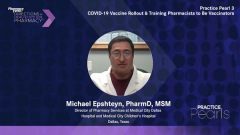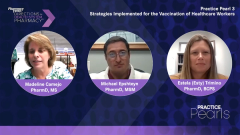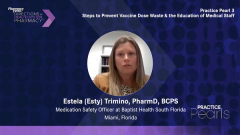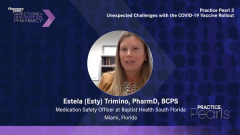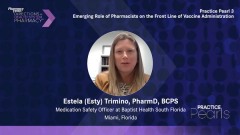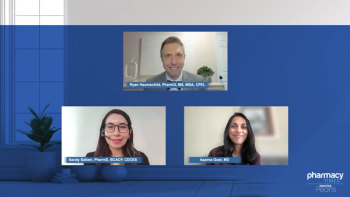
Practice Pearl 3: COVID-19 Vaccine Rollout & Training Pharmacists to Be Vaccinators
Madeline Camejo, PharmD, MS, and Michael Epshteyn, PharmD, MSM, discuss pharmacy’s involvement in the COVID-19 vaccine rollout and training pharmacists to be vaccinators.
Madeline Camejo, PharmD, MS: Let’s go on to another subject for COVID-19, including the vaccine rollout. What were some of the things that each of us did during that time? For us in pharmacy, it was an interesting time. We’re used to running inpatient operations, and all of a sudden, the government asked us to start creating vaccination pods and be able to run. This is what I would call a complete rollout of pharmacy and vaccination in outpatient services. One of the questions I’m going to ask is what was the pharmacy involvement in your COVID-19 vaccine rollout at your institution? Michael, comment on your procurement, storage, and preparation. What were the things that you had to do to dispense the vaccines?
Michael Epshteyn, PharmD, MSM:Excellent question. I agree with you, Madeline. We were excited that at the end of 2020, finally there was a vaccine approved for emergency utilization authorization and, of course, the first vaccine that was approved for COVID-19 was the Pfizer-BioNTech vaccine. And it required an ultra-low temperature freezer, and none of the pharmacies had those freezers because we never needed them. We had to do what you normally do when it’s something new and you don’t know what to do: reach out to colleagues. I reached out to our laboratory colleagues. I was lucky. We have a stem cell lab on campus [at Medical City Dallas Hospital], and they happened to have a new freezer that had the right temperature range for the storage of the Pfizer vaccine. We secured that freezer and calibrated it for storage, and that was how we received our first shipment in December 2020. It was such an exciting and hopeful moment for all of us, and it was probably 1 of the most memorable moments in my career, when I held that cute little box of frozen vaccines with little purple tops on them. I knew that was the beginning of the end, the light at the end of the tunnel.
The Pfizer vaccine was first, and of course we had to make sure we had enough for first doses and second doses. We worked very closely with our HR [human resources] and employee health colleagues who organized those clinics, so that we did it in an organized and tiered approach. That went really well, and we’ve done first doses and second doses. Then we got some Moderna vaccines as well. At this point, we have been able to immunize all health care workers. It’s not mandated, but it’s strongly encouraged. It’s been a great experience, and I was so excited to be in the field of pharmacy where we were everywhere with that vaccine—from procurement, storage, preparation, and then to pharmacists now becoming vaccinators.
Until about 2005, vaccination certification for pharmacists wasn’t common. Our new graduates get their vaccination certifications through their pharmacy school. But some of us who graduated prior to that had to take an APhA [American Pharmacists Association]–sponsored course and become vaccinators. I was 1 of them. That was a great experience, and I was humbled to see the role of pharmacy expanded to pharmacists being able to administer vaccines. It’s a great public service, and pharmacists are the most available through the community pharmacy. It just makes sense that the pharmacist would be able to offer vaccines, with COVID-19 vaccines among them. That was an exciting time and my personal and professional silver lining from 2020 was to see vaccines come to our facility and to watch all those videos and see all those excited selfies of health care workers who got their shots and got little stickers saying, “I’ve been immunized.” It was a very moving, exciting experience, and I was humbled and happy to be part of it.
Transcript edited for clarity.
Newsletter
Stay informed on drug updates, treatment guidelines, and pharmacy practice trends—subscribe to Pharmacy Times for weekly clinical insights.

